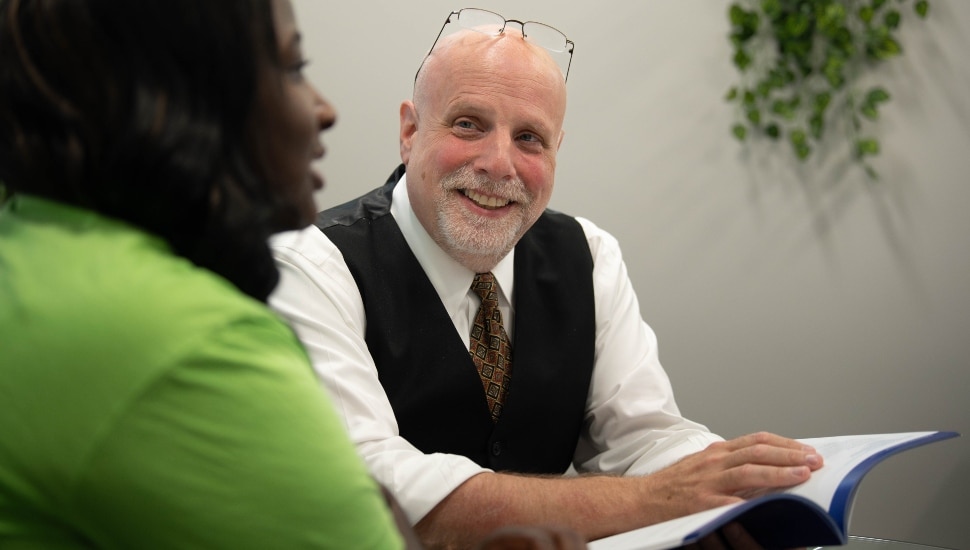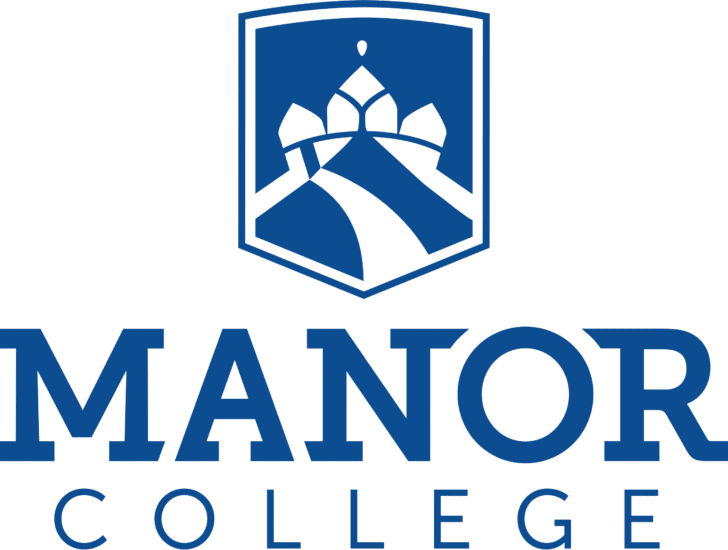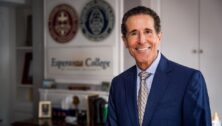Bucks County Leadership: Tom Sims, Vice President of Institutional Advancement, Manor College

Tom Sims, Vice President of Institutional Advancement at Manor College, spoke with BUCKSCO Today about growing up in Rockledge, where he filled the role of class clown both in his family and at school. He also recalled how he learned his work ethic from a job at a convenience store and why he chose Temple University.
Sims also discussed what sets Manor College apart and how he’s trying to help students through this year’s issues with federal financial aid. And, he shared the significant role that family plays in his life and how he hopes to replicate that feeling on Manor’s campus.
Where were you born, and where did you grow up, Tom?
I grew up, strangely enough, only about a half mile away from Manor College and the Sisters of Saint Basil the Great. I was born and raised in Rockledge, a small town that not many people know. It sits between Jenkintown and Northeast Philadelphia, Fox Chase.
What did your parents do?
My dad was a Carpenter, and my mom was in Secretarial Practice until she became a Homemaker. It was funny because they were both very keen on all of us getting to college, but they couldn’t afford to send us. We were on our own.
Where were you in the pecking order? How many brothers and sisters?
I was second to last out of five. I had my older sister, who is a Professor and the Dean of the business scheool here at Manor as well. I have two older brothers, and then my younger sister.
And what was your role in the family?
Class clown, I guess you could say. I was definitely trying to get the laughs.
What memories stay with you from growing up in Rockledge?
It’s all the basic memories like the ice cream truck coming around. When you’re younger, you don’t think about what’s going on in the world. I was born in 1965, so I grew up in the late ’60s and early ’70s. There was a lot of tension, a lot of rioting, and a lot of trouble. But you don’t think about that when you’re a kid; you’re just watching Sesame Street and PBS and living your life.
What jobs did you have growing up?
When I was 10, I started delivering newspapers for the Philadelphia Bulletin. I started out with my friend Louie, who let me help him out. Then I got my own route, and everything took off from there.
After the newspaper, I worked at a local convenience store. Back then, it was called AM/PM. I did the night shift and the day shift and had eight hours in between to try to get some sleep.
It taught me a lot about taking the initiative. My brother gave me the advice, “You never have to ask anybody to take out the trash or clean. Just do it.” It stuck with me. Throughout my career, I’ve taken on jobs that other people might not necessarily want to burden themselves with. And it’s what’s got me in such a good spot.
What did you do that made you stand out in school?
In grade school, it was getting in front of the class and reciting from all the comedy albums I had. I did not have music albums. I had comedy albums. Bill Cosby’s Why Is There Air?, Flip Wilson, Steve Martin, and George Carlin. Teachers would let me get up and recite things in front of the class as a joke. I loved it when people laughed. I carried the tradition into high school.
Where does that comedy edge, that sense of timing, come from?
It was those comedy albums and listening to Dr. Demento on the radio. He was wacky. I also watched Monty Python. I was able to get a sense of that timing and what’s funny and what’s not funny. I wanted to pick apart what made that funny.
Did you have a favorite musical group while you were growing up?
I enjoy anything that’s well-produced. I’ve got to know that somewhere behind the scenes was somebody who was keeping things well-orchestrated. I’m not going to use this as a favorite, but for example, ELO, the Electric Light Orchestra: Jeff Lynne — he knows how to get the sounds together.
I’m a big fan of Marvin Gaye, Sam Cooke, and Nat King Cole. These are the vocalists that resonate with me. And their work is, of course, well-produced.
So, where did you go to college?
I went to Temple University. Theirs was probably the application closest to me at my high school guidance counselor’s office. And financially, it was a good choice for me back then. I commuted. There wasn’t money to have me stay on campus, and I didn’t need to.
In retrospect, Temple was an excellent choice. Here at Manor, we have small classes. We need that because we need to customize learning for a lot of students who are somewhat apprehensive about post-secondary ed. But at Temple, I wasn’t apprehensive about post-secondary ed. I only wanted to climb in the back of the class and get my work done.
In my junior year, the registrar called me into their office to ask, “What’s your major because you haven’t declared one?” I didn’t know. She said, “Well, either you become an English major, and you get to leave at your normal time frame because you took a lot of English classes. Or choose anything else and stay another year for whatever it is you study.” I said, “Well, that’s easy — I’m an English major.”
The English major was great. I’m a big believer in certificates because I received their Certificate in Business Writing as part of my degree. I’m a big believer in credential layering, and we at Manor are starting to move in that direction as well to give people as many tools as needed to get their job done and succeed.
Temple was also good because being in the surroundings of North Philadelphia gave me a sense of how big the world was and how much need there was out there. It made me think, “What am I going to do to help?” When I left school, my goal was to find out where I could be the most helpful. I ended up going into charitable organizations like food banks and social services and now higher education.
Did you go on to get your MBA?
I did, at Purdue. That was during COVID. I said I was going to take a year off after Temple, and that turned into 35. Purdue had a fantastic program. It fit right in with my schedule, because it was online, as well as being able to leverage my expertise.
Who were the people who saw promise in you across the years, Tom?
Throughout my career, I’ve been privileged to come across people who see in me things that I don’t necessarily see in myself. But at least they acknowledge and recognize it, and I can move forward from there. Certainly, Kelly Peiffer and Dr. Jonathan Peri here at Manor had seen that. I’ve flourished in this higher-education setting.
Over the years, I acknowledge the people who saw something in me, but it’s a two-way street. We served one another. It really comes down to God’s providence getting me where I need to be. And I’m glad that I was able to respond and get to a place where I needed to be.
In many cases, it comes down to privilege. I want to acknowledge that, because not everybody gets those breaks. And while you want to give God his due, you also want to make sure that the next person gets the opportunity you received. Give every single person the privilege.
And who understands that better than Manor College?
Well, that’s exactly why Manor College is here. We’ve got opportunities for students who can be very apprehensive about post-secondary education. I was first generation, right? My dad and my mom said, “Hey, that’s great. I mean, we can’t pay for it, but yeah, you can go off to college.” Some of the parents of today’s first-generation students aren’t exactly thrilled. The attitude is more like, “Why do you want to do that? We need you to go to work.”
That’s just the reputation that higher ed has right now. It’s taking it on the chin a little bit.
It’s expensive. And many people ask, “What is the payoff?” So we have to surround our students with support unlike even what is given at home sometimes. That’s the reason for the small classes and all-around support here. And of course, we have one of the most reasonable tuition rates in the state.
I don’t see any other school doing exactly what we do. You’ve got bigger universities and larger two-year colleges, and these institutions might bring you in, but they won’t necessarily give the customized attention. Some students are just thrown into the mix.
And Manor College is perfectly positioned, not just philosophically with Jonathan Peri at the head, but geographically, too, in Northeast Philadelphia. If there’s a place with beautifully blended diversity in America, it’s in Northeast Philadelphia, right?
Yes, such as neighborhoods like Olney, and Hunting Park.
I first started right when the pandemic did, and our administration said, “Well, we can’t host a graduation, so we’ll send lawn signs out to every graduate.” There were neighborhoods in the inner city. I wanted to hand deliver those.
It was great. I got the chance to talk with the grandparents and ask, “How do you feel?” The response was, “Oh, I feel so great. She’s the first person to go to college from our family.” I talked to one little kid and asked, “Your sister just got a sign. What about you? You planning to come to Manor?” He smiled and said, “Yeah, I’m going to go.”
You’re halfway through the year, Tom. What are your priorities?
Well, for me, it’s making sure that we can get through this FAFSA debacle.
Now’s the time when people start applying and figuring out what their FAFSA financial aid looks like. The changeover to a new system has been a major challenge. But it’s looking like we have more students coming back who want to go to college. That’s good. But for me, I want to make sure that I’m working with my donors to help them be philanthropic and to help our students get here. That is a big concern of mine.
I want to make sure that donors understand what makes college relevant for our students who come here. In general, a lot of people know they’re going to college. Some of our students are not sure about the payoff. Their parents aren’t 100 percent sure either like we said.
I’m trying to figure out how to get everybody on board, including our donors, who haven’t attended or even visited Manor College. It’s a more philanthropic approach. You’re helping because you got your start somewhere, and we’re hoping that you’ll help somebody else get their start.
What do you do with all that free time that you have?
Mostly it’s spending time with family. That’s a big deal; people underestimate that. We’ve got grown kids, and nothing calls them back to home better than a free meal.
Movies are a big thing for me, too. I love movies and entertainment. One of the classes I teach here is cultural diversity in film. I volunteer to do a movie review column every week for a magazine in South Jersey.
Share your list of your top three favorite movies.
Always the number one — and it makes me sound very pretentious, so take it for what it is — is To Kill a Mockingbird. It’s also my favorite book. The second is the compilation —I can’t say one — but the compilation of the franchise Toy Story. And my third favorite may be Groundhog Day with Bill Murray.
There are a few that have come out recently that I added to my top 10 list. Just Mercy is an outstanding movie with Jamie Foxx and Michael B. Jordan about the origin story of Bryan Stevenson, a lawyer in the South who started the Equal Justice Initiative. It’s very moving.
Three last questions for you. What’s something big that you’ve changed your mind about, Tom?
For me, it’s about race and racism. In this country, we’re still segregated. Seventy years after Brown v. Board of Education, and so many years after everything, we are still a separated and segregated society in so many ways. And that is tragic. That’s why I teach my classes in Cultural Diversity of Film, because Hollywood is one of the worst offenders, even though they think they’re one of the most woke.
People subscribe to their old ways of thinking — whatever their elders taught them — which was more than likely wrong. We all need to see what the truth looks like.
It’s a crazy world out there, Tom. What keeps you hopeful and optimistic?
My family and more importantly my wife, who is all about putting family first. When Sunday rolls around, we host a big family dinner. We are blended: She has two sons, and I have two daughters. Her son will ask, “Are you cooking, Mom? Or is Tom cooking?” Because if I’m cooking, it’s a one-pot meal. But it’s going to be good (I don’t care what anybody says; my sausage and peppers are still the best).
Now, if my wife is cooking, she cuts every vegetable up and makes sure everything is fresh. She makes it seem effortless, but it’s not. It’s her dedication that keeps the kids coming around (not my big pot meals). My daughters call her a bonus mom, which is a fun term I’d never heard.
Family keeps me going, and we foster that sense of belonging here at Manor College as well. You may not have it at home, within your family structure. But when you come here, we try to create a sense of belonging, like at a big family dinner.
Finally, Tom, what’s the best advice you’ve ever received?
Again, I’m going back to my wife because of her family-first commitment. It’s nothing she’s ever said. It’s only through her actions. It’s what attracted me to her in the first place. I had two grown-ish kids. She did as well. I needed somebody in my life who was aware that grown kids can still be a pain in the neck.
They’re grown, but it doesn’t mean they’re completely grown. She is family-first with Sunday dinners and her diligence in making sure that we all get together. We went bowling last weekend for her birthday. We were all there. And that’s what family means. It’s so important to make sure those ties are strong, no matter who you call family.
Connect With Your Community
Subscribe for stories that matter!
"*" indicates required fields






























